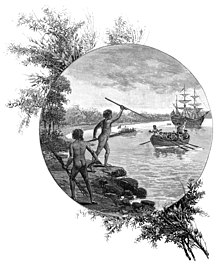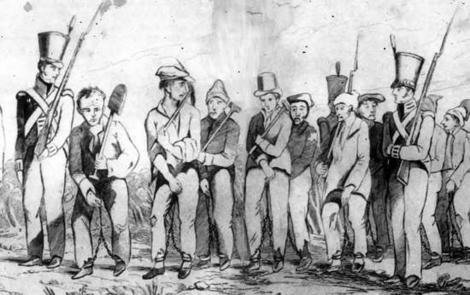History of Indigenous Australians
The History of Indigenous Australians is thought to have spanned 40,000 to 45,000 years, although some estimates have put the figure at up 80,000 years before European settlement. For most of the time, Indigenous Australians lived as nomads and as hunter-gatherers with a strong dependence on the land and their agriculture for survival.
The path of Australian Aboriginal history changed radically after the 18th and 19th century settlement of the British. Indigenous people were displaced from their ways of life, were forced to submit to Europeans rule, and were later encouraged to assimilate into Western culture. Since the 1960, reconciliation has been the pursuit of European Australian - Indigenous Australian relations.

Australian Frontier Wars
The Australian Frontier Wars were a series of conflicts fought between Indigenous Australians and Europeans settlers that spanned a total of 146 years. The first fighting took place several months after January 26, 1788 and the last clashes occurred as late as 1934.
A recent study calculated indigenous fatalities caused by the Queensland Native Police Force alone to no less than 24,000, and most scholars accept an overall minimum of 20,000 for all the colonies. Violent frontier deaths of Europeans and associates, on the other hand, have been estimated as between 2,000 and 2,500.
European Exploration of Australia
The European Exploration of Australia encompasses several waves of seafarers and land explorers. Although Australia is often loosely said to have been discovered by Royal Navy Lieutenant, James Cook in 1770, he was merely one of a number of European explorers to have sighted and landed on the continent prior to English settlement, and he did so 164 years after the first such documented encounter. Nor did the exploration of Australia end with Cook, explorers by land and sea continued to survey the continent for many years after settlement.

Convicts in Australia
During the late 18th and 19th centuries, large numbers of convicts were transported to the various Australian penal colonies by the British government. One of the primary reasons for the British settlement of Australia was the establishment of a penal colony to alleviate pressure on their overburdened correctional facilities. Over the 80 years more than 165,000 convicts were transported to Australia.
The number of convicts pales in comparison to the immigrants who arrived in Australia in the 1851-1871 gold rush. In 1852 alone, 370,000 immigrants arrived in Australia. By 1871 the total population had nearly quadrupled from 430,000 to 1.7 million people. The last convicts to be transported to Australia arrived in Western Australia in 1868.

Suffrage in Australia
Suffrage in Australia refers to the right to vote for people living in the Australia, including all its six component states and territories, as well as local councils. The colonies of Australia began to grant universal male suffrage during the 1850's and women's suffrage followed.
Though the various parliaments of Australia have been constantly evolving, the key foundations for elected parliamentary government have maintained and historical continuity in Australia from the 1850's into the 21st century.

Federation of Australia
The Federation of Australia was the process by which the six separate British self-governing colonies of New South Wales, Queensland, South Australia, Tasmania, Victoria and Western Australia formed one nation. They kept the systems of government that they had developed as separate colonies but also would have a federal government that was responsible for matters concerning the whole nation. When the Constitution of Australia came into force, on 1 January 1901, the colonies collectively became states of the Commonwealth of Australia.

Military History of Australia During World War 1
In Australia, the colonies of World War 1 was greeted with considerable enthusiasm. Even before British declared war on Germany on 4 August 1914, the nation pledged its support alongside other states of the British Empire and almost immediately began preparations to send forces overseas to participate in the conflict. The first campaign that Australians were involved in was in German New Guinea after a hastily raised force known as the Australian Naval and Military Expeditionary Force was dispatched from Australia to seize German possessions in the Pacific in September 1914. At the same time another expeditionary force, initially consisting of 20,000 men and known as the First Australian Imperial Force, was raised for service overseas.

Military History of Australia during World War 2
Australia entered World War 2 shortly after the invasion of Poland, declaring war on Germany on 3 September 1939. By the end of war, almost a million Australians had served in the armed forces, whole military units fought primarily in the Europeans theatre, North African Campaign, and South West Pacific theatre. In addition, Australia came under direct attack for the first time in its post-colonial history. Its casualties from enemy during the war were 27,073 killed and 23,477 wounded.

Immigration to Australia
Immigration to Australia is estimated to have begun around 51,000 years ago when the ancestors of Australian Aborigines and Torres Strait Islanders arrived on the continent via the islands of the Malay Archipelago and New Guinea. Europeans first landed in the 17th and 18th centuries, but colonisation by the British only started in 1788.









1 comments:
This is a story about history of Australia
Post a Comment